The Talos Principle: Reawakened
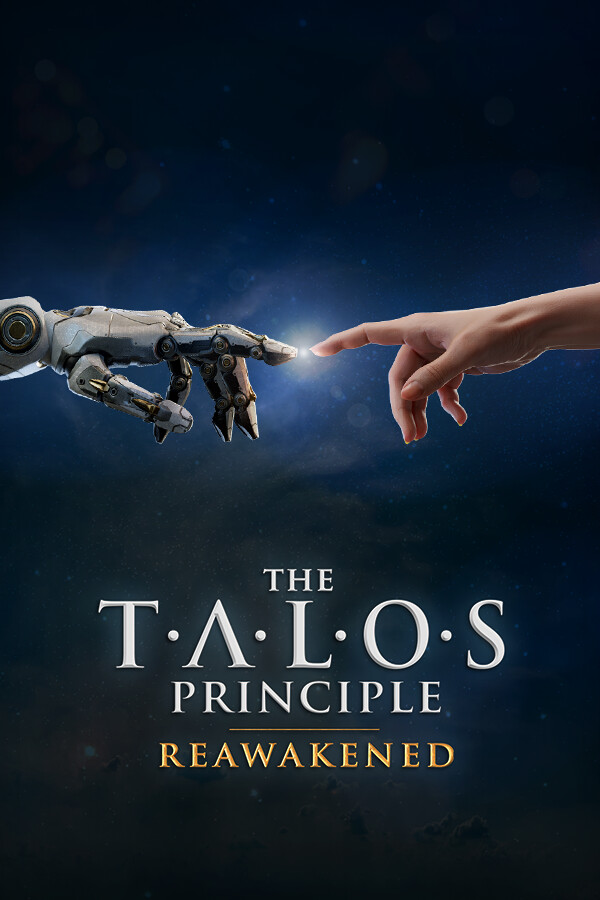
Difficulty : 2.5/5 (A bit Hard)
4/5 for In the Beginning
Global : 5/5 (Perfect)
This review was written for Thinky Games and has been cross-posted here. Please see the original article.
A flood of memories came back as I booted The Talos Principle: Reawakened. I remember being stunned as I listened to that powerful, ominous menu music for the first time. It was then that I knew The Talos Principle would be special. The Talos Principle: Reawakened aims to give a second wind to that classic game through active level editor support and graphics that won’t get old for a long time. So, let’s go into detail!
First things first. The most important feature of Reawakened is that nothing has been touched. The physics, the scenery, the texts – the original experience is completely intact. I feared they would try to entirely “fix” the game to make it feel more like The Talos Principle 2. If you’re like me and love seeking out, let’s say, “special” solutions, then you know how broken the original game was. Lots of puzzles could be cheesed with weird platforming by taking advantage of the many decorative elements, implying you could also explore out-of-bounds areas easily. I loved that so much! To the point where the first thing I did after a few puzzles was platforming my way out of the Reawakened tutorial. That “brokenness” actually added a lot of depth and potential to the meta puzzles; it wasn’t used much in the game but was cleverly exploited in the old custom campaigns.
The main change is obviously the graphics, the Serious Engine being dropped for Unreal Engine since The Talos Principle 2. I think the original graphics are still very good, but let’s be honest – this is better. Both Talos Principle games have a strong visual identity – The Talos Principle 2 especially outdid itself in terms of magnificent architecture – not much was required to make those environments shine. However, The Talos Principle 1 was more basic and needed an extra dose of oomph, so there’s a heavy focus on the lighting in this remake. You can tell right away how much effort went into it, and it works wonders without damaging the atmosphere of the game.
There are still a few problems, though, like the water showing weird reflections. It might just be my settings as I “only” have an RTX 3070. You can expect roughly the same performance as The Talos Principle 2. My framerate was a bit worse on average, but I also had almost no stuttering.
An important feature concerns the infamous recorder. This mechanic allows you to record actions that a clone can repeat. Items are also duplicated, leading to very intricate and brain-twisting puzzles in which you can easily softlock. The main problem concerned the timings. If you wanted your clone to stand still for 30 seconds… well, yeah, you had to record and stand still for 30 seconds. Any error also meant you needed to re-record everything again, and they happened all the time as this is by far the most complex mechanic in the game. The fast-forward feature helped speed up the process, but that wasn’t enough. The line between fair and frustrating was just too easily crossed, preventing this mechanic from shining its brightest.
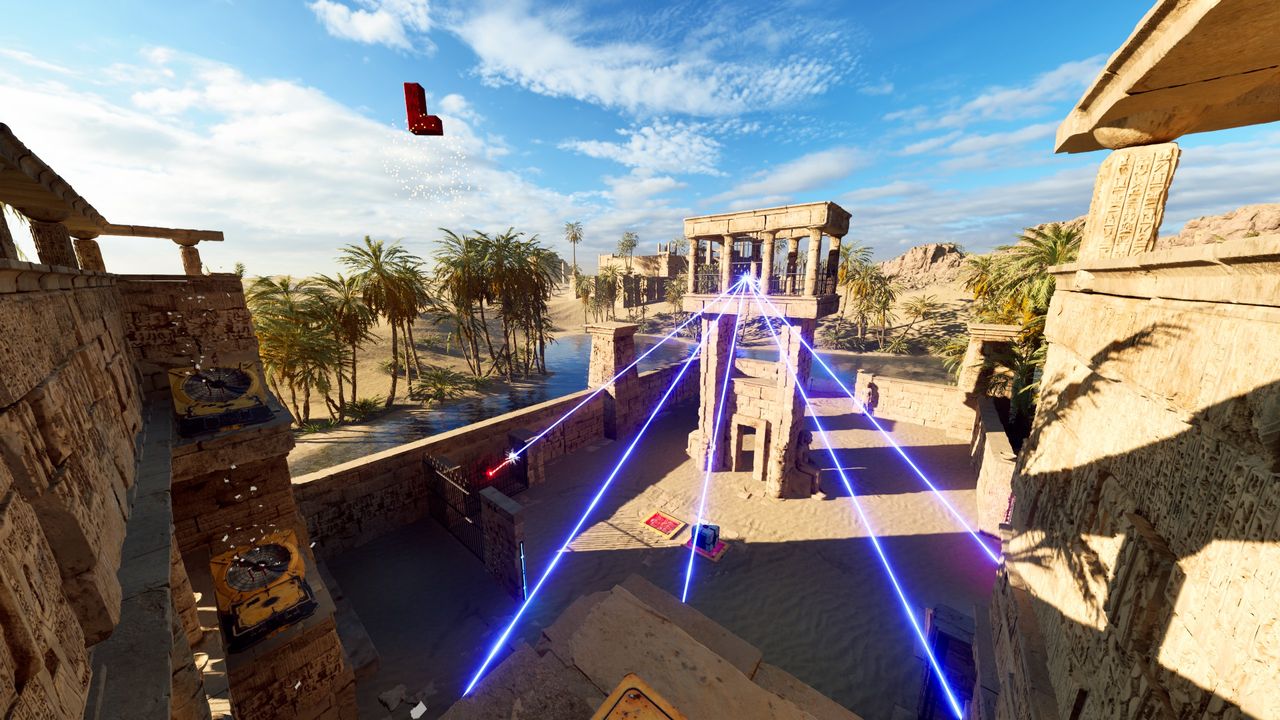
And so, the recorder revolution has happened! Checkpoints can now be set up during the recording; they automatically pause the replay and thus completely nullify the time you spent doing nothing, and you can even rewind! The recorder puzzles are much, much better now. And there’s even more! If you can pause the recording whenever you want, doesn’t that mean you can stop a perpetually moving copy wherever you want? It’s not something I immediately thought about, yet this feature is more than just quality of life inclusion; it actually adds much more depth to the game’s puzzles.
The new rewind feature is not only restricted to the recorder puzzles and can be used at any time to go back a few seconds in time. It’s very useful to prevent softlock situations and for weird people like me who love doing parkour everywhere. I still encountered a few bugs, but I’ve no doubt Croteam will quickly address them.
The hints have also been reworked a bit. In the original game, you couldn’t get any of them before you got access to the final temple hub. This is not the case anymore. You now need to explore and find purple medals gently hidden inside the worlds and puzzles. They give you access to the messenger worlds much earlier, which is a good thing as it better spreads their discovery throughout the game. You can also now gain up to 9 total hints instead of 3. I don’t usually use hints, but The Talos Principle targets a wide audience and isn’t the easiest game to complete. These tweaks to the hint system mean the game is more balanced now.
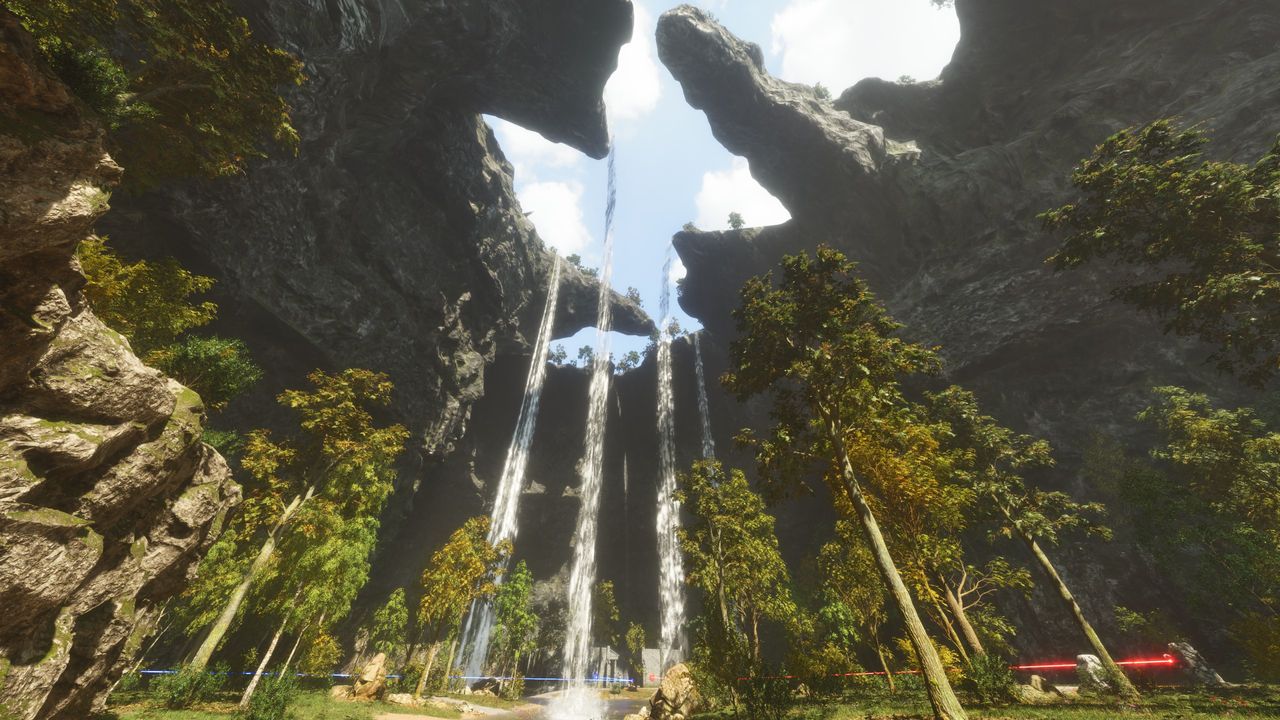
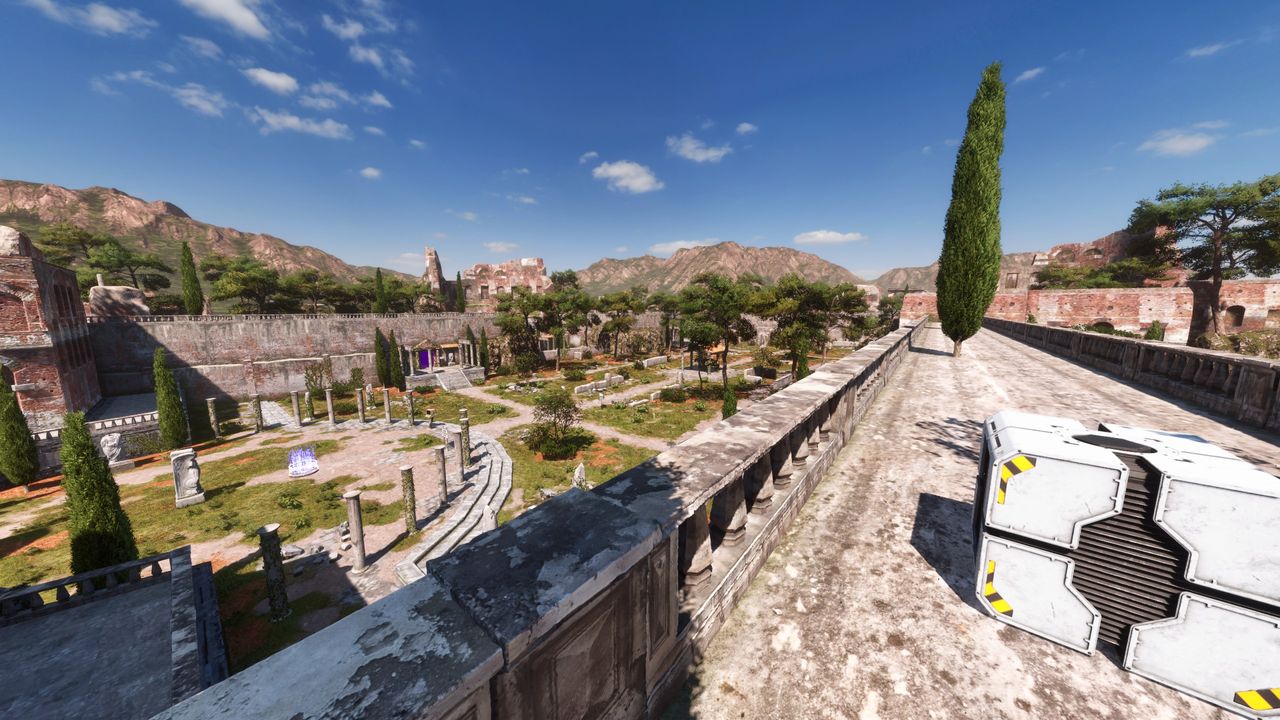
One of the two major additions is the level editor. Yeah, I know, you’re dying to know more about the other one, the new chapter, we’ll get to it! The original game had workshop support for custom maps, but it wasn’t an easy-to-use editor like this one. As a result, there were only a few maps available, and some of them even became unplayable without changing the game’s version, which was annoying. I still played and completed most of them, though, and what I can tell you is that they are, still to this day, the best puzzle experience I’ve ever had by far. You can always count on the community to get creative and push everything to its limits; the potential of The Talos Principle far exceeds what you can imagine. I have no doubt that new campaigns of the same quality will emerge, especially if Croteam keeps holding puzzle jams and incentivizing creativity like they did for the demo.
A few minor additions like the developers’ commentary (which I completely forgot about because it’s turned off by default, so be careful if you want to hear those interesting messages!) or new music also enrich this remake. The soundtrack of The Talos Principle has always been incredible, and a new delightful version of “Virgo Serena” (that menu music I love so much) graces our ears in the final temple hub.
It’s finally time to talk about the new chapter, In the Beginning! Taking place during the early testing phase of the Simulation, we follow Alexandra Drennan and her team as they talk about this first test and about their life. Philosophy has been tuned down a bit. No terminal is to be found here, only (funny) bug reports. The focus is on the dialogue, and I have to say, it’s a nice change from the texts of the base game.
The highlights are the conversations between Alexandra and the young Elohim. As you solve puzzles, Elohim tries to learn and understand more about their mission and their future. The innocent nature of this Elohim and the heartfelt answers of Alexandra have a very touching side, explaining why Elohim has grown so much since then.
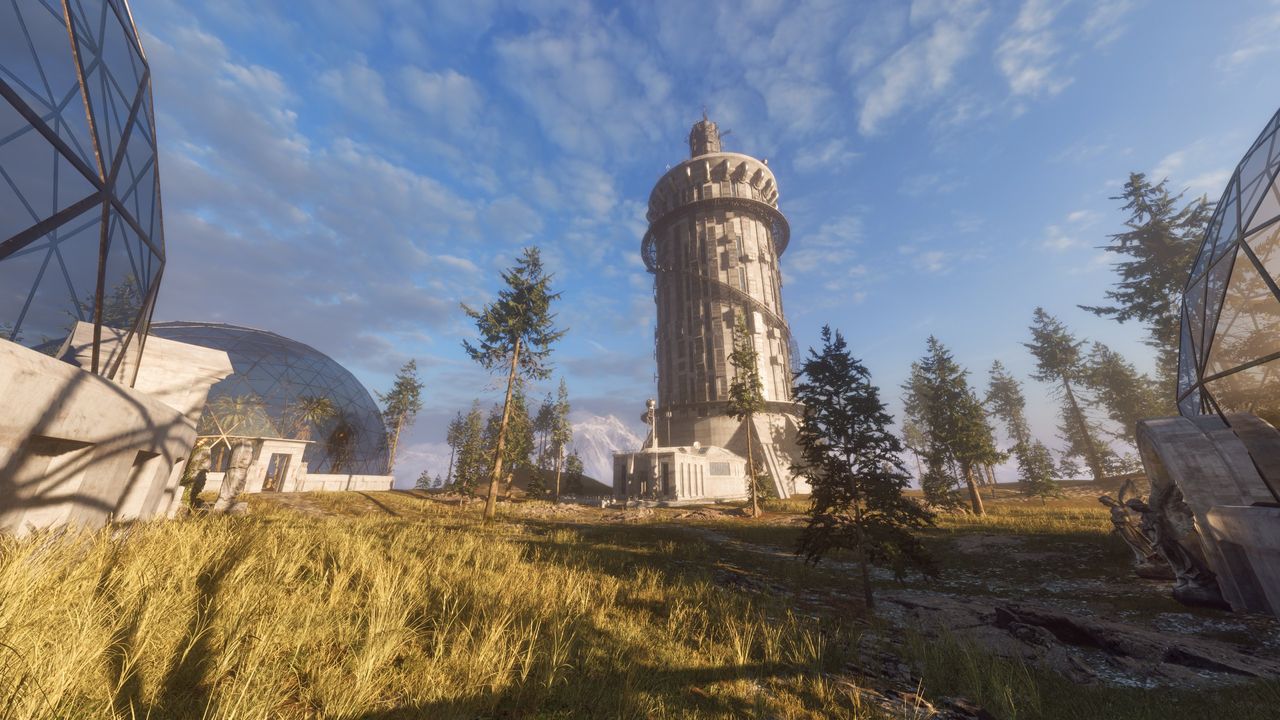
In the Beginning can be seen as a miniature version of the base game, consisting of a small tower and a world for each of the three biomes. Each world has 6 puzzles and a star, which may seem a bit low, but don’t worry, we’re talking about very high-quality puzzles. Some of them are straightforward but brutal, to the point I sometimes didn’t even know if my solutions were intended. Some others are large and intricate, with several steps required, in the purest style of Talos 1. I found them to be particularly inspired as they take full advantage of the new quality of life features and aren’t scared to put you in tricky softlock situations. There are no turrets or sentry mines though, which I found a bit strange as they were a huge part of the base game.
I didn’t like the stars in The Talos Principle 2, and I’m glad to see the developers bothered to make new ones for this chapter. Two of them are locked behind a harder part of a puzzle while the third one requires ingenuity. It’s nice to see they haven’t lost it, but there’s no new meta/interconnected puzzle, which still left me a bit concerned. Come on Croteam, this is a gold mine you got there! I absolutely didn’t expect In the Beginning to be in the continuity of the Road to Gehenna difficulty and it was a great pleasure as I’m a big fan of very challenging puzzles. Overall a pretty much perfect addition to me, though I don’t know if that would justify a buy in itself. It took me 6-7 hours to beat everything, so you be the judge!
The Talos Principle is extremely important to me. Not only is it my favorite puzzle series, I also believe it plays a crucial role in the puzzle scene, and it all comes back to Portal yet again. I’m not teaching you anything new by saying Portal is one of the most beloved series in the puzzle realm. It was revolutionary and set the bar extremely high for 3D puzzle games. Plenty of games tried to take inspiration from it or even straight-up copy it, and while some of them were good, none could even aspire to compete. Well, none except for The Talos Principle.
Back in 2014, Portal 2 was only three years old when The Talos Principle was released. As time went by, two things became clear: Portal 3 would never come, and The Talos Principle would one day become a series. You probably know where I’m heading now.
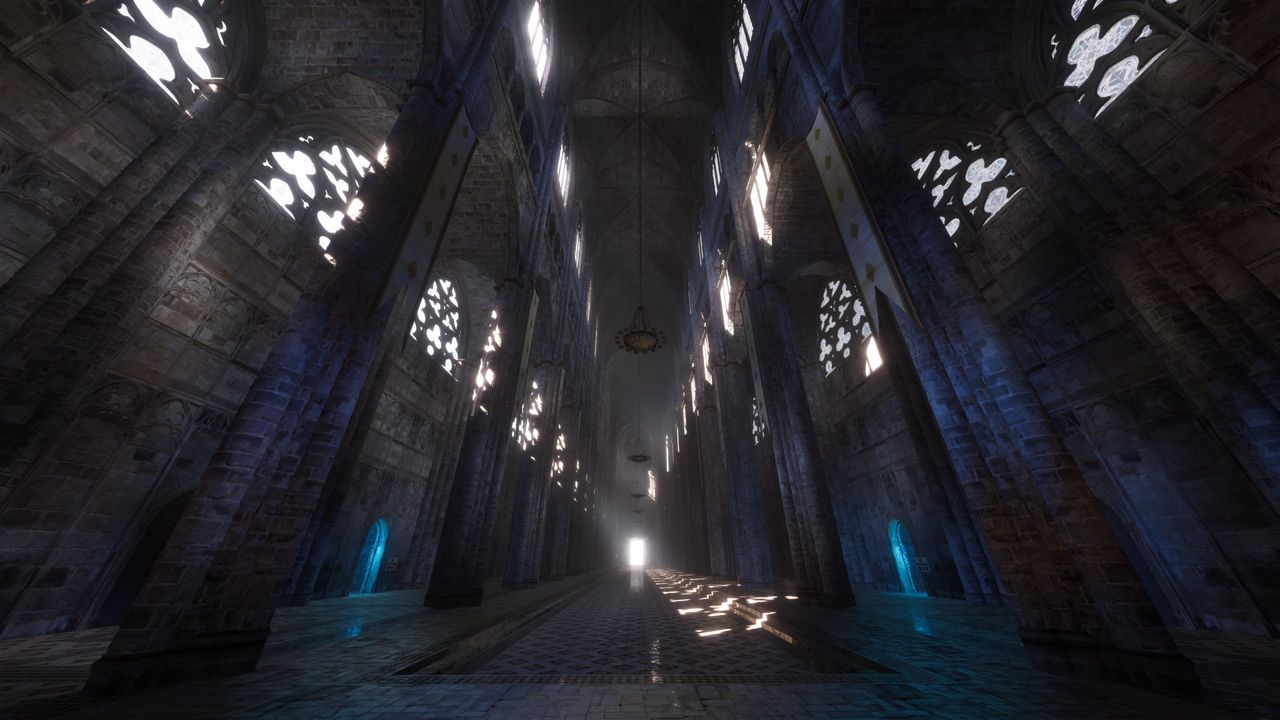
The wait for The Talos Principle 2 was long but finally over in 2023, and just like its predecessor, it was critically acclaimed and lived up to expectations. Now, how many other similar games of this caliber were released during that time? Yeah, zero. It’s the only series that, still to this day, explores and pushes further ahead the chamber-based puzzles. The Talos Principle is carrying the torch.
I know making games like this is difficult. In general, puzzle games are kind of niche, and developers have to get creative with minimal resources. But their popularity is precisely the reason why Portal and The Talos Principle are so important. It’s not just about being masterpieces, it’s also about spreading the passion for puzzles to a larger audience. I personally became a puzzle enthusiast thanks to these two series that both blew my mind, they literally changed my life! And I know I’m far from being the only one, this can’t be understated.
The Talos Principle goes even beyond that as it’s a series that emphasizes philosophy, which is extremely rare in the video game industry. I’m not a philosophy guy at all, yet I find it brilliant how the Talos games make it interesting yet approachable, like Milton remembering your answers and directly challenging your beliefs.
Anyway, I’m more than ready to sink a few hundred hours into the community puzzles before the next Talos masterpiece drops. Have a good (re)discovery!
Developer: Croteam
Publisher: Devolver Digital
Platforms: Steam – Windows, PlayStation 5, Xbox Series, GeForce Now
Release Date: April 10, 2025
